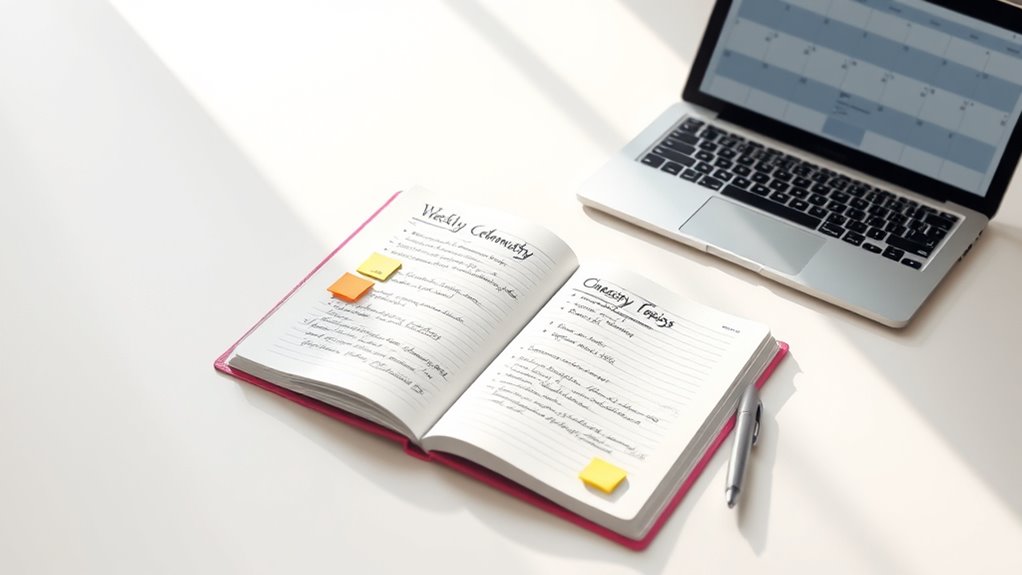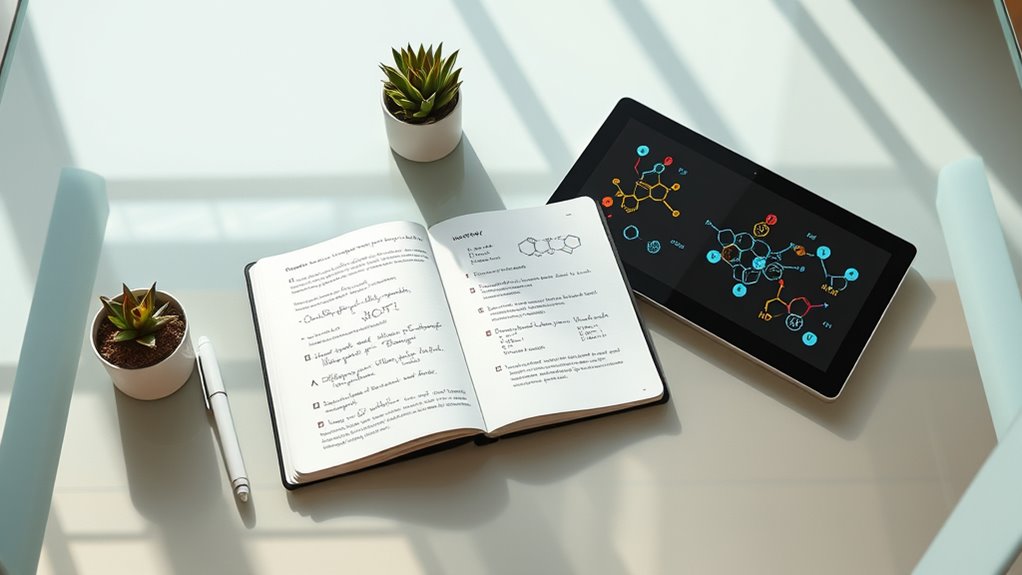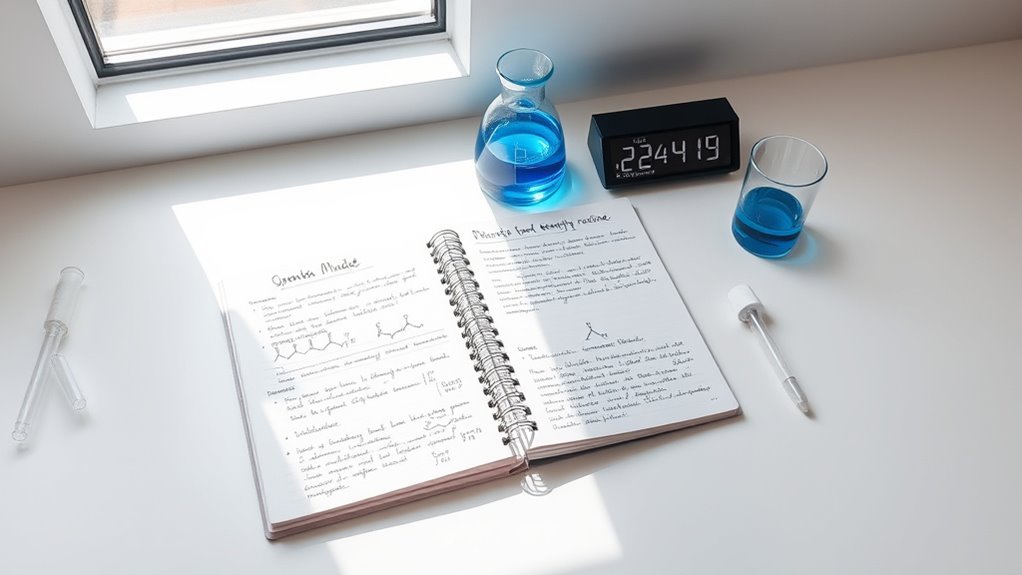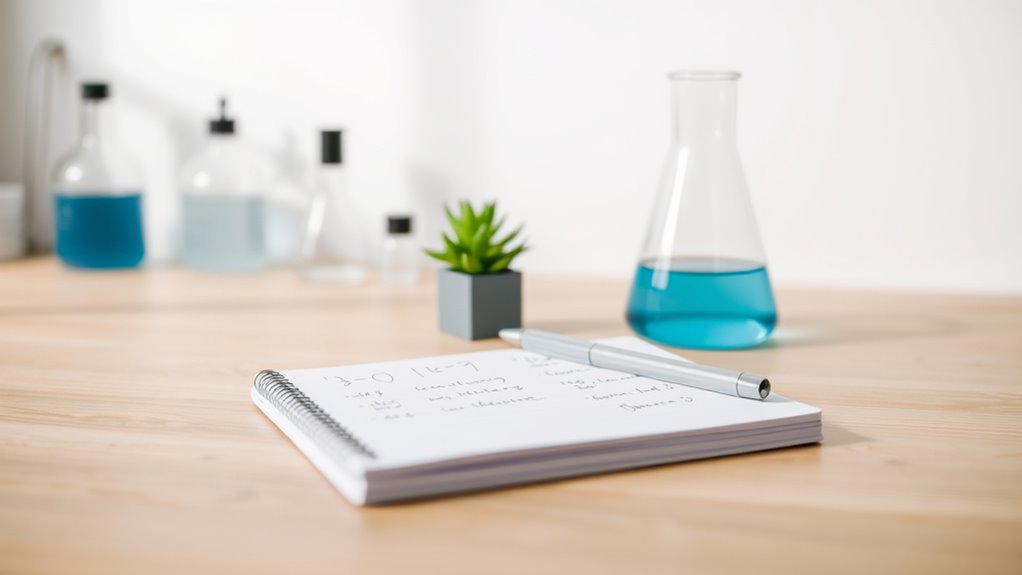To make the most of just 10 minutes a day, set clear, achievable goals each week focusing on high-impact topics like atomic structure or reactions. Use quick online tutorials, flashcards, or diagrams to reinforce key concepts efficiently. Practice active recall by testing yourself and review regularly with spaced repetition. Keep a simple journal to track progress and plan your next steps. Stay consistent, and you’ll discover how a minimalist routine can lead to steady chemistry mastery—if you keep exploring, you’ll find even more ways to excel.
Key Takeaways
- Prioritize high-impact topics and focus on foundational concepts with quick tutorials and visual aids for efficient learning.
- Use spaced repetition with brief daily reviews and weekly reflections to reinforce memory without overextending time.
- Utilize active recall through self-quizzing and teach-back methods to maximize retention in short sessions.
- Incorporate mobile apps, flashcards, and concise resources for flexible, on-the-go study during spare minutes.
- Maintain a simple learning journal to track progress, clarify doubts, and refine your minimalist routine weekly.
Setting Clear and Achievable Goals for Your Weekly Chemistry Practice

To make your weekly chemistry practice effective, you need to set clear and achievable goals. Start by identifying what you want to learn or improve that week. Be specific—do you want to master a particular concept, memorize key formulas, or practice solving a certain type of problem? Break down larger goals into manageable steps so you can track your progress easily. Avoid vague objectives like “study chemistry,” and instead focus on concrete targets. Setting realistic goals keeps you motivated and prevents frustration. Remember, your goals should challenge you but still be within reach. Write them down and review them regularly to stay focused. Clear, attainable goals give your weekly routine direction and help you make steady progress. Incorporating specific candy-related examples can also make studying more engaging.
Selecting the Most Impactful Topics to Cover Each Week

After setting clear goals for your weekly chemistry practice, choosing the right topics becomes the next step to guarantee meaningful progress. Focus on concepts that build on each other and align with your objectives. Prioritize topics that are foundational or frequently tested, like atomic structure, bonding, or reactions. To help you decide, consider this table:
| High-Impact Topics | Why They Matter |
|---|---|
| Atomic Theory | Core understanding of matter |
| Chemical Reactions | Essential for problem-solving |
| Periodic Table | Connects properties and trends |
Select topics from this list based on your goals, emphasizing quality over quantity. Covering impactful topics ensures your weekly sessions remain focused, efficient, and truly beneficial for your chemistry mastery.
Utilizing Efficient Resources for Quick Learning Sessions

To maximize your learning in just 10 minutes, leverage curated online tools, focused textbooks, and specialized apps. These resources help you access accurate information quickly and stay on track with your goals. Using them efficiently can make your weekly chemistry sessions more productive and enjoyable. Incorporating revolution skincare ingredients can also provide insight into innovative formulations relevant to skincare science.
Curated Online Tools
Have you ever wondered how to make your chemistry review sessions more efficient? Curated online tools can help you maximize your limited time. First, use websites like Khan Academy or ChemCollective for quick, targeted tutorials. Second, explore flashcard platforms like Anki, which offer pre-made decks for rapid review. Third, check out YouTube channels dedicated to chemistry concepts—bite-sized videos that clarify tricky topics instantly. These resources are designed for fast comprehension and can be accessed anytime, anywhere. They eliminate the need for heavy textbooks and lengthy lectures, letting you focus on key concepts. Incorporating visual learning techniques can further enhance your understanding and retention of complex chemistry topics. By leveraging these curated tools, you streamline your learning process, making even brief study sessions highly productive and effective.
Focused Textbooks and Apps
Focused textbooks and apps serve as efficient tools to enhance your quick learning sessions. They provide targeted content that helps you grasp key concepts quickly without overwhelming you with unnecessary details. Choose resources specifically designed for short, focused study periods, like concise summaries and practice quizzes. Interactive apps often include flashcards, mini-quizzes, and visualizations, making complex topics easier to understand in minutes. Keep your selections relevant to your current learning goals, whether it’s memorizing formulas or understanding reactions. Using these tools allows you to reinforce knowledge efficiently, fitting study into busy schedules. Regular use of focused textbooks and apps transforms brief moments into productive learning opportunities, helping you stay consistent and confident in your chemistry progress. Incorporating anime-inspired mnemonics can also boost memory retention during quick review sessions.
Incorporating Visual Aids and Diagrams to Enhance Understanding

Using visual aids and diagrams can substantially boost your understanding of complex chemistry concepts. They turn abstract ideas into concrete visuals, making it easier to grasp relationships and processes. To maximize their impact, consider these steps:
Visual aids transform abstract chemistry ideas into clear, memorable visuals for better understanding.
- Identify key concepts that benefit from visual representation, such as molecular structures or reaction mechanisms.
- Create simple diagrams that highlight important parts, avoiding clutter to keep focus clear.
- Use color coding to differentiate elements, charges, or states, reinforcing memory and comprehension.
- Incorporate visual learning techniques to further enhance clarity and retention of water chemistry principles.
Applying Active Recall to Reinforce Key Concepts

Active recall is a powerful tool to strengthen your understanding of chemistry concepts. By using spaced repetition strategies and effective recall techniques, you can enhance your memory retention. Implementing these tips helps you remember key points more easily and study more efficiently.
Spaced Repetition Strategies
Since our memory naturally forgets details over time, applying spaced repetition strategies helps you reinforce key chemistry concepts effectively. By reviewing material at strategic intervals, you strengthen your long-term retention. To implement this, consider these steps:
- Schedule quick review sessions after 1 day, then 3 days, and finally a week.
- Use active recall during each session, testing yourself without looking at notes.
- Focus on areas you find most challenging, increasing review frequency for those topics.
- Incorporate understanding of nutritional advantages of green juice to deepen your grasp of health-related chemistry concepts.
This method ensures you actively engage with the material over time, preventing forgetfulness. Spaced repetition transforms short-term memorization into lasting understanding, making your weekly chemistry routine more efficient and effective.
Effective Recall Techniques
Have you ever tried to recall a chemistry concept only to realize it’s hazy or forgotten? Effective recall techniques help solidify your understanding. Instead of passively rereading notes, test yourself actively. Use flashcards with questions on one side and answers on the other, forcing your brain to retrieve information. Try explaining concepts aloud as if teaching someone else; this reinforces your grasp. Quizzing yourself regularly, especially without looking at your notes, makes the information stick. Spaced retrieval—reviewing key ideas at increasing intervals—boosts long-term memory. Avoid simply reviewing notes passively. Instead, challenge yourself to recall, explain, or write down concepts from memory. These active methods turn passive review into powerful reinforcement, making chemistry concepts more durable and easier to access when you need them. Incorporating evidence-based techniques ensures your study sessions are more effective and efficient.
Memory Retention Tips
Building on effective recall techniques, applying these strategies consistently can substantially improve your memory retention of chemistry concepts. To maximize retention, try these methods:
- Schedule regular review sessions to revisit concepts before forgetting sets in.
- Test yourself frequently with flashcards or practice questions to strengthen your recall.
- Teach the material to someone else, which forces you to organize and reinforce your understanding.
Engaging in Simple Practice Problems and Experiments

Why are simple practice problems and experiments essential for mastering chemistry? They turn abstract concepts into tangible skills. When you work through problems, you reinforce your understanding of formulas, reactions, and principles. Experiments bring theory to life, helping you see how concepts work in real-world scenarios. Engaging regularly keeps your mind sharp and boosts confidence. You don’t need complex setups—simple problems and basic experiments are enough to build foundational knowledge. As you practice, you’ll recognize patterns and improve problem-solving speed. This active learning approach makes chemistry less intimidating and more manageable. By dedicating just a few minutes to these activities each week, you develop a habit that cements your understanding and prepares you for more advanced topics without feeling overwhelmed.
Keeping a Learning Journal to Track Progress and Insights

Keeping a learning journal helps you document weekly insights and see how your understanding develops over time. By tracking your progress, you can identify areas where you’ve improved and those needing more focus. This practice keeps you motivated and ensures your chemistry journey stays organized and intentional.
Subheading 1: Document Weekly Insights
Have you ever wondered how tracking your weekly chemistry progress can boost your understanding? Documenting insights helps you identify patterns, reinforce concepts, and stay motivated. To make the most of it, try:
- Summarizing key lessons or discoveries each week
- Noting questions or challenges to revisit later
- Reflecting on how new knowledge applies to real-world scenarios
Subheading 2: Track Personal Growth
Maintaining a learning journal is a powerful way to track your progress and deepen your understanding of chemistry. As you write regularly, you’ll notice patterns in your learning, identify areas where you excel, and pinpoint concepts that need more attention. Recording your insights helps solidify new ideas and makes abstract concepts more tangible. It also boosts your motivation by showing tangible progress over time. When you reflect on past entries, you’ll see how much you’ve improved and where your curiosity has grown. Keep your journal simple—note key concepts, questions, and breakthroughs. This habit encourages consistency, accountability, and a deeper connection to your learning journey, transforming your minimal routine into a meaningful and sustainable growth tool. Incorporating AI security measures can also help protect your personal learning data and ensure your progress remains confidential.
Utilizing Spaced Repetition for Long-Term Retention

Spaced repetition is a powerful technique that helps you remember chemistry concepts more effectively over the long term. It involves reviewing information at increasing intervals to reinforce your memory. To get the most out of this method, focus on:
- Scheduling reviews: Plan quick sessions—initially daily, then weekly, then monthly—to revisit key topics.
- Using active recall: Test yourself instead of passively rereading; quiz your understanding of formulas, reactions, or concepts.
- Tracking progress: Keep a log of what you’ve reviewed and identify areas needing reinforcement.
- Understanding the role of dreams: Engaging with prophetic dreams or subconscious insights can sometimes enhance memory and creativity, indirectly supporting your learning process.
Making Use of Mobile Apps and Podcasts for On-the-Go Learning

Mobile apps and podcasts have revolutionized the way you learn chemistry on the go, making it easier to fit study sessions into your busy schedule. With apps, you can review key concepts, practice quizzes, and access interactive simulations anytime, anywhere. They’re convenient tools that help reinforce learning during commutes or quick breaks. Podcasts offer engaging explanations, recent discoveries, and discussions with experts, turning idle moments into productive learning opportunities. You can listen while walking, exercising, or doing chores, transforming routine activities into chemistry lessons. These resources are flexible, accessible, and often free, allowing you to customize your learning experience. Incorporating multimedia resources into your weekly routine can enhance retention and understanding of complex topics. By integrating mobile apps and podcasts into your weekly routine, you’ll keep your knowledge sharp without adding extra time to your busy days.
Reflecting and Planning for the Following Week’s Focus

After utilizing apps and podcasts to reinforce your chemistry learning, taking time to reflect and plan helps maximize your progress. It’s a simple step that keeps you focused and motivated. Start by reviewing what you achieved this week:
- Identify topics you mastered and areas needing improvement.
- Set specific goals for the upcoming week to target weak spots.
- Adjust your routine based on what worked best, whether it’s more review or new challenges.
This process ensures you’re intentionally progressing, rather than just going through the motions. Spend a few minutes each week to assess your understanding, celebrate small wins, and craft a clear plan. Consistent reflection and planning turn your minimal routine into a powerful learning tool.
Frequently Asked Questions
How Can I Stay Motivated With a Minimalist Study Routine?
You stay motivated by setting clear, achievable goals for each study session. Celebrate small wins to keep your momentum going, and remind yourself of the bigger purpose behind your routine. Keep your study sessions focused and manageable, so they don’t feel overwhelming. Find ways to make chemistry engaging—like quick experiments or relatable examples—and track your progress. Staying consistent and recognizing your improvements will boost your motivation over time.
What Are Common Pitfalls in Weekly Chemistry Learning?
Think of chemistry learning like traversing a river; common pitfalls are like sudden rocks that can capsize your progress. You might skip foundational concepts or cram before tests, causing confusion or burnout. To avoid this, focus on consistent, small steps and clarify your doubts early. Remember, even expert navigators respect the river’s currents—so pace yourself and stay attentive to avoid getting stuck or overwhelmed.
How Do I Measure My Progress Effectively?
You can measure your progress by regularly testing yourself with quizzes or practice problems to see how well you grasp concepts. Track your understanding by noting improvements in accuracy and problem-solving speed. Keep a journal of topics you’ve mastered and areas needing review. Seek feedback from peers or instructors to get an external perspective. Consistently reviewing your performance helps you identify growth and adjust your study routine accordingly.
Can This Routine Help Prepare for Exams Quickly?
Yes, this routine can help you prepare for exams quickly. It’s designed to maximize your study efficiency by focusing on core concepts and practicing active recall. By dedicating just a few minutes each day, you’ll reinforce your understanding and identify weak spots fast. This minimalist approach keeps you consistent without burnout, making your exam prep more effective and less stressful. Stick with it, and you’ll see progress in no time.
How Adaptable Is This Routine for Advanced Chemistry Topics?
You can definitely adapt this routine for advanced chemistry topics. It’s flexible enough to incorporate deeper concepts like thermodynamics or quantum mechanics by dedicating more time to complex problems and advanced readings. You’ll find that breaking down topics into manageable sessions helps maintain focus and retention. With some tweaks, this minimalist approach can support your mastery of even the most challenging chemistry subjects efficiently and effectively.
Conclusion
By setting clear goals, choosing impactful topics, and utilizing efficient resources, you create a routine that fuels your progress. Incorporate visual aids, active recall, and spaced repetition to deepen understanding. Keep a journal to reflect, plan, and celebrate each milestone. Embrace mobile apps and podcasts for continuous learning on the go. Stay consistent, stay curious, and watch your chemistry mastery grow—because with focus, effort, and passion, you turn small steps into big achievements.









